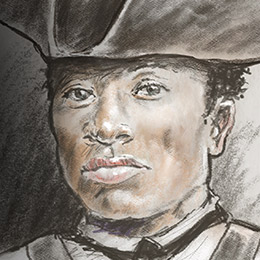
Winsor Fry
Former slave fighting as a patriot, and navigating life in a new nation
On the eve of Revolution, all thirteen rebelling colonies legally practiced slavery. Though there is no record of Winsor’s birth, it is likely that he was born enslaved. In 1773 prominent Rhode Islander Thomas Fry bequeathed “my Negro man named Windsor” to his youngest son Joseph, along with other property including several plots of land. Two years later however, Winsor joined the Continental Army as a free man.







